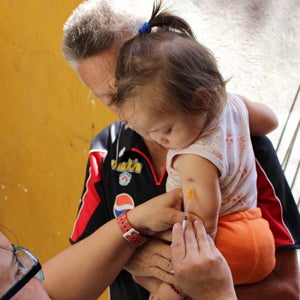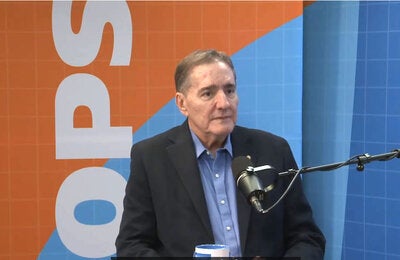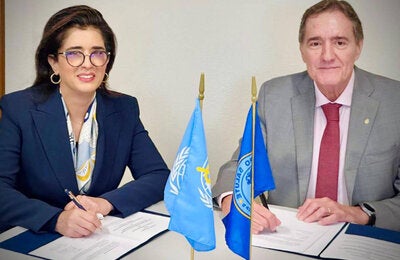Maintaining high and homogeneous immunization coverage, strengthening surveillance and quickly responding to suspected cases are some of the suggested measures to maintain measles elimination in the Americas
Washington, DC, 16 March 2018 (PAHO/WHO)- The Pan American Health Organization/World Health Organization (PAHO/WHO) warned that in the face of ongoing measles outbreaks in the Americas, countries should redouble efforts to vaccinate their populations, strengthen surveillance to detect possible patients, and implement measures to quickly respond to any suspected cases, according to an epidemiological update released today.

Measles was declared eliminated from the Americas in 2016, following the declaration of rubella and CRS elimination in 2015. The Region was the first in the world to have eliminated all three diseases, culminating a 22-year effort involving mass vaccination against measles, mumps, and rubella throughout the Americas. However, the highly contagious nature of the measles virus and the fact that both it and the rubella virus continue to circulate in the rest of the world mean that the Region is at risk of outbreaks.
In the first months of 2018, there were night countries in the Region reporting confirmed cases: Antigua and Barbuda (1 case), Brazil (14 cases), Canada (4 cases), Guatemala (1 case), Mexico (4 cases), Peru (2 cases), the United States (13 cases), and Venezuela (886 cases in total, 159 cases in 2018), according to the epidemiological update.
In 2017, four countries in the Region of the Americas reported confirmed cases of measles: Argentina, Canada, the United States of America, and Venezuela. Additionally, cases of measles in the European region quadrupled in 2017, which increases the risk of imported cases to countries in the Americas. PAHO/WHO has been alerting countries of this situation since May 2017, and through successive epidemiological updates.
In light of this situation, PAHO/WHO has recommended the following to its countries:
- Vaccinate to maintain 95% homogeneous coverage with the first and second doses of the measles, mumps, and rubella (MMR) vaccine in all municipalities.
- Strengthen epidemiological surveillance in public and private health services to detect suspected cases.
- Respond quickly when an imported measles case is detected in order to prevent the reestablishment of endemic transmission of the virus; this includes activating teams to follow up on patients with measles and their contacts.
- Maintain a reserve of measles-rubella (MR) vaccines in each country of the Region for imported case control actions.
In 2017, the countries of the Americas pledged to take action to maintain the elimination of measles, rubella and congenital rubella syndrome by approving an action plan for that purpose. The plan emphasizes that vaccination coverage rates in a population should be 95% or above in order to maintain elimination. In the last five years, regional coverage with the first dose of the MMR vaccine has ranged between 92% and 94%.
Measles is one of the most contagious diseases and affects primarily children. It is transmitted by airborne droplets or via direct contact with secretions from the nose, mouth, and throat of infected individuals. Symptoms include high fever, generalized rash all over the body, stuffy nose, and reddened eyes. It can cause serious complications including blindness, encephalitis, severe diarrhoea, ear infections and pneumonia, particularly in children with nutritional problems and in immunocompromised patients.
Links
- PAHO: epidemiological update on measles (March 16 2018)
- PAHO: all epidemiological updates on measles
- PAHO Measles
- Ministries of Health of the Americas pledge action to keep the region free of measles and rubella



